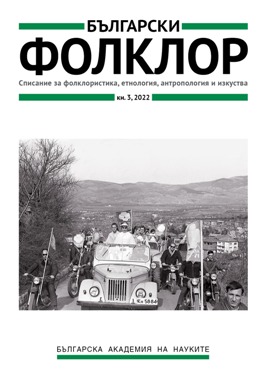Категорията „смесен брак“ и държавната администрация в контекст на етническо прочистване: немците в България в края на Втората световна война
The Category “Mixed Marriage” and State Administration in the Context of Ethnic Cleansing: Germans in Bulgaria at the End of World War II
Author(s): Lyubomira Valcheva-NundlollSubject(s): Politics / Political Sciences, Politics, History, Anthropology, Social Sciences, Language and Literature Studies, Gender Studies, Law, Constitution, Jurisprudence, Cultural history, Psychology, Semiotics / Semiology, History of Law, Human Rights and Humanitarian Law, Theoretical Linguistics, Applied Linguistics, Governance, Public Administration, Public Law, Sociology, Diplomatic history, Economic history, Ethnohistory, Military history, Political history, Social history, Recent History (1900 till today), Special Historiographies:, Theology and Religion, Lexis, Sociolinguistics, Economic policy, Government/Political systems, Security and defense, Military policy, Cultural Anthropology / Ethnology, Culture and social structure , Social psychology and group interaction, Social development, Social differentiation, Management and complex organizations, Studies in violence and power, Family and social welfare, Sociology of Culture, WW II and following years (1940 - 1949), Period(s) of Nation Building, History of Communism, Fascism, Nazism and WW II, Migration Studies, Inter-Ethnic Relations, Ethnic Minorities Studies, Social Norms / Social Control, Penal Policy, Sociology of Politics, Philosophy of Law, Sociology of Religion, Sociology of Law, Geopolitics, Politics of History/Memory, Politics and Identity, Identity of Collectives, Peace and Conflict Studies, Asylum, Refugees, Migration as Policy-fields
Published by: Институт за етнология и фолклористика с Етнографски музей при БАН
Keywords: intermarriage; mixed family; administrative classification; political transformation; degermanization
Summary/Abstract: The German population living in the Eastern European territories reached by the Red Army in 1944 was subjected to systematic cleansing. In Bulgaria, this process took place within an institutional framework and generated a substantial dialogue between the Soviet Control Commission, the Bulgarian State, and its German inhabitants. The study of this administrative dialogue reveals movements in the categorical repertoire created on institutional level in order to identify potential foreign enemies. Belonging of the so-called Germans to the national community was assessed through their religious, historical, social, or family affiliations. The heterogeneity of this population grouped from above reveals a strong social reality: the anti-German measures mainly affected individuals from mixed families, legally or ethnically related to the German world. This mixity appears to have been a problematic attribute for the ongoing administrative classification. The specificity of the category of intermarriage and its function multiplied the facets of this population and encompassed through the family institution the existing perceptions of what was an ‘enemy’ or a ‘friend’ of the new order. The classification of undesirable persons from mixed families generated unequal relations with the state, between locals and foreigners, between citizens and non-citizens, but also between women and men. By looking at the diversity of the studied group through the lens of identity representation analysis numerous questions related to the aspects of the complex social reality of the Bulgarian population at the end of World War II arise.
Journal: Български фолклор
- Issue Year: XLVIII/2022
- Issue No: 3
- Page Range: 313-331
- Page Count: 19
- Language: Bulgarian
- Content File-PDF

